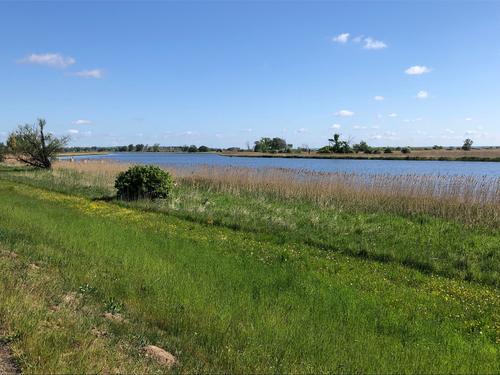
No longer an idyll: fish are dying in the Oder River.
© Florian SchöneRenaturation of the Oder must now have top priority
The environmental disaster in the Oder River has led to mass deaths of fish and other animals in the river. So far, almost 140 tons of fish carcasses have been taken from the natural stream in the heart of Central Europe. According to the conviction of the environmental and nature conservation organizations united in the "Aktionsbündnis lebendige Oder" (Action Alliance for a Living Oder), the full extent of the disaster cannot be assessed for at least a few weeks. However, a comparison with the Sandoz disaster on the Rhine in 1986, when firewater contaminated with toxic chemicals after an accident at the chemical company caused mass fish deaths and serious damage to the ecosystem, can be drawn now. "We demand from politics and administration on both sides of the Oder that the causes are completely clarified, damaging influences such as the currently ongoing Oder expansion are stopped immediately and a comprehensive remediation concept for the Oder is created," said DNR managing director Florian Schöne on behalf of the ten organizations involved in the action alliance. Plans on both sides of the Oder to develop the river into a water highway must be shelved.
The Leibniz Institute of Freshwater Ecology and Inland Fisheries (IGB) yesterday published its interim results of the causal research. The researchers see indications that the mass death of fish and mussels was possibly caused by an algal bloom with toxic effects. At the same time, the experts make it very clear that this is not a natural phenomenon, but a man-made problem. There are currently reports in the Polish media of large saline discharges in the area of the industrial city of Głogów in the period from July 29 to August 10, 2022. In addition, anglers reported a fish kill above Wrocław as early as July. There, in turn, the authorities state that the official laboratory results of the state authorities in Poland can no longer be found.
Polish Prime Minister Mateusz Morawiecki last week promised to restore the Oder River to its original state. "If Morawiecki is serious about his statements, all harmful environmental impacts must be stopped immediately - this includes especially the current and planned expansion works in the river. Recovery of the animal and plant world through renaturation of the river must now be given top priority," Schöne continued. In the view of the action alliance, this requires the development of an action plan for the restoration of the Oder, accompanied by comprehensive funding. "The example of the Sandoz disaster on the Rhine shows that recovery of the Oder is possible," Schöne explained, adding, however, that "the processing of the environmental disaster must be ensured by an independent group of experts. Furthermore, it must be ensured that monitoring systems on the Oder or the alarm systems of the riparian countries are functioning to be able to react better in the future. The public must be informed much earlier and in several languages about the pollution of the Oder.
Background:
The Oder is one of the last large, near-natural rivers in Europe. For about 500 kilometers, the Oder flows into the Baltic Sea without major obstructions, surrounded by intact and species-rich floodplains. The Polish and German governments have been carrying out planning on the Oder for years, ostensibly to improve flood protection. However, an expert report commissioned by the Oder Alliance showed that these plans would increase the flood risk. And what's more: Poland's inland waterway strategy even envisages an expansion to an international waterway. However, the already approved plans violate EU environmental law, destroy protected areas with their natural landscapes and endanger species and ecosystems.
Ten German nature conservation and environmental organizations joined forces several years ago in the "Action Alliance for a Living Oder" and cooperate with Polish and Czech nature conservation associations in the coalition "Time for the Oder". The common goal is to preserve and sustainably use the river landscape of the natural Oder across borders.
Members of the „Aktionsbündnis lebendige Oder“:
Bund für Umwelt- und Naturschutz (BUND), WWF Deutschland, Deutsche Umwelthilfe (DUH), Deutscher Naturschutzring (DNR), Rewilding Oder, Naturschutzbund Deutschland (NABU), EuroNatur, Heinz Sielmann Stiftung, Michael Succow Stiftung, Verein der Freunde des Deutsch-Polnischen Europa-Nationalparks Unteres Odertal
Press contact:
EuroNatur-Pressestelle: Anja Arning | Tel.: +49 7732 9272 13 | E-Mail: anja.arning@euronatur.org
BUND-Pressestelle: Clara Billen | Tel.: +49 30-27586-464 | E-Mail: presse@bund.net
DNR-Pressestelle: Thorsten Greb | Tel.: +49 160 5102258 | E-Mail: thorsten.greb@dnr.de
WWF Deutschland-Pressestelle: Tobias Arbinger | Tel.: +49 30-311777425 | E-Mail: tobias.arbinger@wwf.de
Rewilding Oder Delta-Pressestelle: Katrin Schikorr | Tel.: +49 151 5672 7500 | E-Mail: katrin.schikorr@rewilding-oder-delta.com
DUH-Newsroom: Tel.: 030 2400867-20, presse@duh.de
NABU-Pressestelle: Katrin Jetzlsperger | Tel.: +49 173 35 55 202 | E-Mail: Katrin.Jetzlsperger@NABU.de
Heinz-Sielmann-Stiftung-Redakteur Biodiversität: Dr. Axel Wessolowski | Tel.: +49 5527 914-448, Mobil: +49 160 2405125 | E-Mail: axel.wessolowski@sielmann-stiftung.de


